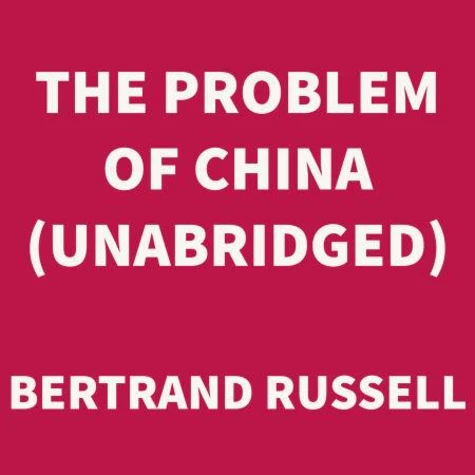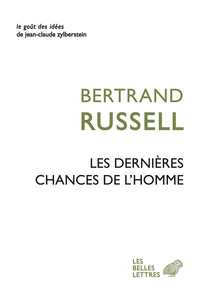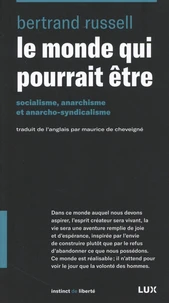Prix Nobel de Littérature
The Problem of China (UNABRIDGED)
Par : ,Formats :
Disponible dans votre compte client Decitre ou Furet du Nord dès validation de votre commande. Le format MP3 est :
- Pour les liseuses autres que Vivlio, vous devez utiliser le logiciel Adobe Digital Edition. Non compatible avec la lecture sur les liseuses Kindle, Remarkable et Sony
 , qui est-ce ?
, qui est-ce ?Notre partenaire de plateforme de lecture numérique où vous retrouverez l'ensemble de vos ebooks gratuitement
Pour en savoir plus sur nos ebooks, consultez notre aide en ligne ici
- FormatMP3
- ISBN978-1-6693-0419-7
- EAN9781669304197
- Date de parution19/08/2021
- Protection num.pas de protection
- Taille236 Mo
- Infos supplémentairesaudio
- ÉditeurSlingshot Books LLC
Résumé
In 1920-21 Bertrand Russell lived and taught in Peking (Beijing), publishing this book on his return to England. In 1920 he had visited Bolshevik Russia, talked to Lenin, and was unimpressed by what he had seen. China, however, was another matter. Like many travelers, he often saw what he wanted to see, and after Europe's Great War, he found many signs of hope in China. In that country, he was welcomed by the young intellectuals who saw him as a representative of modern and scientific thought.
They, however, were trying to cast off much of the old tradition that they thought held China back, and they were often opposed to Russell's urging that they hold on to much of their own tradition, which he saw as superior to that of Europe, particularly after the terrible slaughter of 1914-18 on the continent. His work is very much a product of its time, and today, almost a century later, many are still trying to explain China -- a very different China from Russell's -- to an outside world.
(Nicholas Clifford)
They, however, were trying to cast off much of the old tradition that they thought held China back, and they were often opposed to Russell's urging that they hold on to much of their own tradition, which he saw as superior to that of Europe, particularly after the terrible slaughter of 1914-18 on the continent. His work is very much a product of its time, and today, almost a century later, many are still trying to explain China -- a very different China from Russell's -- to an outside world.
(Nicholas Clifford)
In 1920-21 Bertrand Russell lived and taught in Peking (Beijing), publishing this book on his return to England. In 1920 he had visited Bolshevik Russia, talked to Lenin, and was unimpressed by what he had seen. China, however, was another matter. Like many travelers, he often saw what he wanted to see, and after Europe's Great War, he found many signs of hope in China. In that country, he was welcomed by the young intellectuals who saw him as a representative of modern and scientific thought.
They, however, were trying to cast off much of the old tradition that they thought held China back, and they were often opposed to Russell's urging that they hold on to much of their own tradition, which he saw as superior to that of Europe, particularly after the terrible slaughter of 1914-18 on the continent. His work is very much a product of its time, and today, almost a century later, many are still trying to explain China -- a very different China from Russell's -- to an outside world.
(Nicholas Clifford)
They, however, were trying to cast off much of the old tradition that they thought held China back, and they were often opposed to Russell's urging that they hold on to much of their own tradition, which he saw as superior to that of Europe, particularly after the terrible slaughter of 1914-18 on the continent. His work is very much a product of its time, and today, almost a century later, many are still trying to explain China -- a very different China from Russell's -- to an outside world.
(Nicholas Clifford)

















